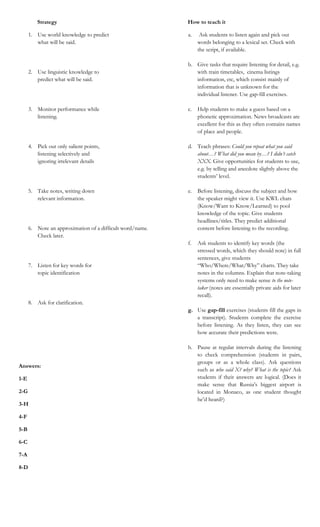Listening strategies match
•Als DOCX, PDF herunterladen•
0 gefällt mir•365 views
matching of strategies and ways of teaching them
Melden
Teilen
Melden
Teilen

Empfohlen
Weitere ähnliche Inhalte
Was ist angesagt?
Was ist angesagt? (20)
Structure of Academic Text/ Before, During and After Reading

Structure of Academic Text/ Before, During and After Reading
Gcu college of education lesson plan template section 1 lesso

Gcu college of education lesson plan template section 1 lesso
Rigor and talk checklist by Kylene Beers and Robert E. Probst

Rigor and talk checklist by Kylene Beers and Robert E. Probst
Meet Me In Memphis: A Framework For Teaching Reading Comprehension

Meet Me In Memphis: A Framework For Teaching Reading Comprehension
Ähnlich wie Listening strategies match
Ähnlich wie Listening strategies match (20)
Unit Plan Worksheet~ RED 4325 Subject Area Reading ~ Professor Car.docx

Unit Plan Worksheet~ RED 4325 Subject Area Reading ~ Professor Car.docx
Teaching listening skills and Spoken Communication Skills

Teaching listening skills and Spoken Communication Skills
Helping the Older Student with Limited Listening Comprehension

Helping the Older Student with Limited Listening Comprehension
Mehr von William Sastoque
Mehr von William Sastoque (20)
Professional development courses 2018 2nd semester 

Professional development courses 2018 2nd semester
Listening strategies match
- 1. Strategy<br />Use world knowledge to predict <br />what will be said.<br />Use linguistic knowledge to <br />predict what will be said.<br />Monitor performance while <br />listening.<br />Pick out only salient points,<br />listening selectively and<br />ignoring irrelevant details<br />Take notes, writing down<br />relevant information.<br />Note an approximation of a difficult word/name. Check later.<br />Listen for key words for <br />topic identification<br />Ask for clarification.<br />Answers:<br />1-E<br />2-G<br />3-H<br />4-F<br />5-B<br />6-C<br />7-A<br />8-D<br />How to teach it<br /> Ask students to listen again and pick out words belonging to a lexical set. Check with the script, if available. <br />Give tasks that require listening for detail, e.g. with train timetables, cinema listings information, etc, which consist mainly of information that is unknown for the individual listener. Use gap-fill exercises.<br />Help students to make a guess based on a phonetic approximation. News broadcasts are excellent for this as they often contains names of place and people.<br />Teach phrases: Could you repeat what you said about…? What did you mean by…? I didn’t catch XXX. Give opportunities for students to use, e.g. by telling and anecdote slightly above the students’ level.<br />Before listening, discuss the subject and how the speaker might view it. Use KWL chats (Know/Want to Know/Learned) to pool knowledge of the topic. Give students headlines/titles. They predict additional content before listening to the recording.<br />Ask students to identify key words (the stressed words, which they should note) in full sentences, give students “Who/Where/What/Why” charts. They take notes in the columns. Explain that note-taking systems only need to make sense to the note-taker (notes are essentially private aids for later recall).<br />Use gap-fill exercises (students fill the gaps in a transcript). Students complete the exercise before listening. As they listen, they can see how accurate their predictions were.<br />Pause at regular intervals during the listening to check comprehension (students in pairs, groups or as a whole class). Ask questions such as who said X? why? What is the topic? Ask students if their answers are logical. (Does it make sense that Russia’s biggest airport is located in Monaco, as one student thought he’d heard?)<br />
